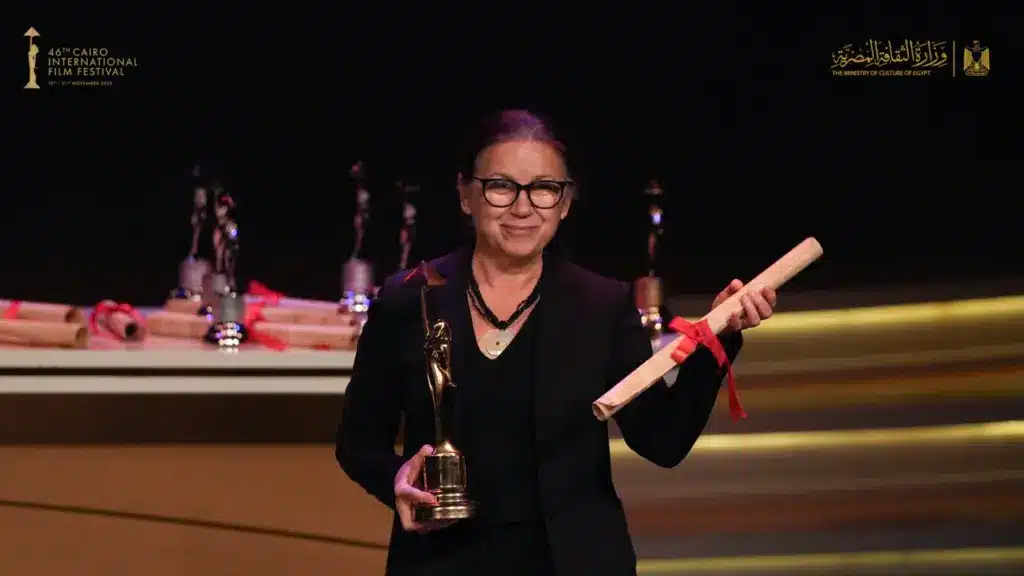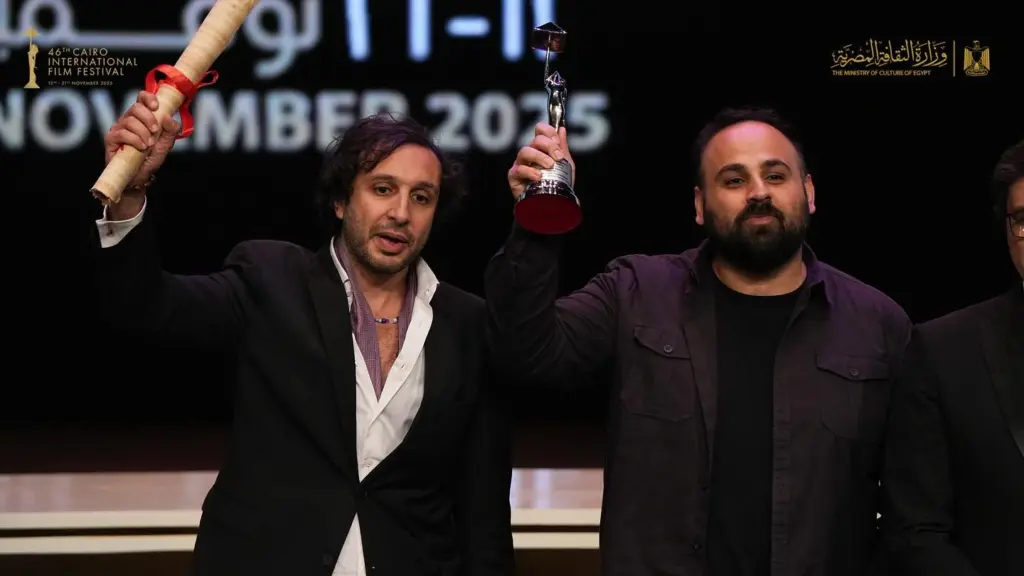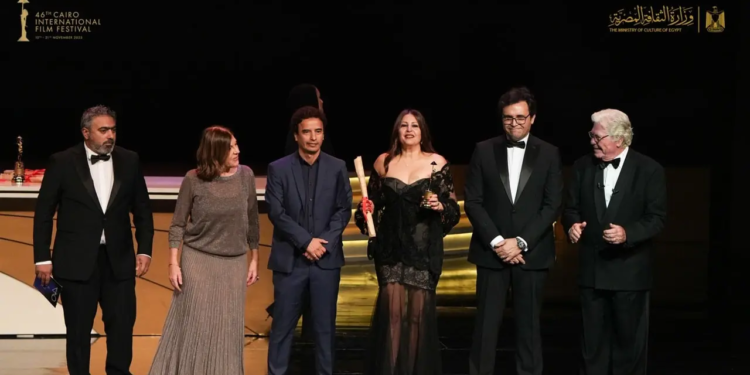The 46th Cairo International Film Festival came to a close at the Cairo Opera House with an evening steeped in remembrance and a renewed sense of responsibility toward cinema. The ceremony opened with the image and recorded voice of six-year-old Hind Rajab — the Palestinian child from Gaza whose desperate call for help, after witnessing her family killed by the Israeli army, resonated across the world before she herself was killed.
Video here (click the link to watch):
https://www.facebook.com/massir.destiniii/videos/1867752923948243
Festival president Hussein Fahmy took the stage to remind the audience that what they had just heard could, at first, sound like a scene from a film — yet it was tragically real. He emphasized that cinema’s strength lies in its ability to document truth, to preserve real stories, and to resist erasure no matter how hard some may try to turn away. “Hind, her story and her voice will remain present,” he said, adding that children like her are not numbers — they are human beings of flesh and blood.
Fahmy went on to express his pride that the festival would close with The Voice of Hind Rajab, directed by Kaouther Ben Hania — a film that revisits the child’s final call, the circumstances of her death, and the way her voice became a global witness. The choice underscored the festival’s commitment to memory and testimony as central to its identity.
In his address, Fahmy also reflected on the diverse sections of this year’s edition — from the main competition and the restored film screenings that continue to draw large audiences, to workshops, masterclasses, and the bustling Cairo Film Market. He thanked the Egyptian institutions that supported this edition, particularly the Ministry of Culture under Dr. Ahmed Fouad Henawy, along with the other ministries involved, the Egyptian Tourism Authority, the Cairo Governorate, and the Cairo Opera House. He congratulated the people of Qatar on the launch of the Doha Film Festival and announced a cooperation agreement between the Cairo International Film Festival and the Qatar Media City Film Commission, aiming to strengthen Arab film production and circulation across borders.
Before the announcement of the awards, several tributes were paid to notable figures of Egyptian and international cinema. Chinese filmmaker Guan Hu was honored for his lifetime achievements and his contribution to contemporary Asian cinema. Hungarian director Ildikó Enyedi, who led a highly regarded masterclass earlier in the festival, received a special tribute for a body of work deeply rooted in identity and perception. Egyptian cinematographer Mahmoud Abdel Samie was also honored for his career. In his acceptance speech, he reflected on his long-standing commitment to preserving Egypt’s cinematic heritage and revealed that discussions are underway to establish a Museum of Cinema in Egypt in the coming years — a project he is personally devoted to.

Once the tributes concluded, the festival moved to the much-anticipated awards.
The Golden Pyramid for Best Film went to Dragonfly by British director Paul Andrew Williams. The Best Actress Award was shared by the film’s two leads, Andrea Riseborough and Brenda Andrew Williams. The Silver Pyramid for Best Director was presented to the Palestinian brothers Tarzan and Arab Nasser for Once Upon a Time in Gaza, which also earned the Best Actor Award for Majd Eid and the Best Arab Feature Film Award, bringing its total to three major wins in Cairo.
Once Upon a Time in Gaza — a co-production between France, Palestine, Germany, Portugal, Qatar, and Jordan — is set in Gaza in 2007. It follows Yahiya, a student, and Osama, a good-hearted drug dealer, who start selling drugs out of a falafel restaurant. Their venture brings them into conflict with a corrupt and arrogant police officer, and tensions escalate as their fragile friendship becomes entangled in a web of violence, moral compromise, and social decay. The film premiered at Cannes, where it already received a Best Director award, before arriving in Cairo with a strong reputation and emotional weight.

The Bronze Pyramid (Jury Prize) went to As We Breathe by Seamus Alton.
The Naguib Mahfouz Award for Best Screenplay was awarded to The Things You Kill by Alireza Khatami. A co-production between Turkey, Canada, France, and Poland, the 113-minute film follows Ali, a literature professor living in Turkey after years in the United States. The death of his mother forces him to return to his family home, confronting a childhood marked by an authoritarian father and a silent mother. The arrival of Reza, a gardener he hires, slowly unveils the darker corners of his past. Through objects, gestures, and unspoken memories, the film explores the weight of inheritance, guilt, and the fear of repeating what one has endured. In addition to the screenplay prize, The Things You Kill also received the FIPRESCI Award from the International Federation of Film Critics, making it one of the most celebrated titles of this year’s edition. The Henri Barakat Award for Artistic Contribution went to Sand City for the cinematography of Matthew Gio Mbini.
In the Horizons of Arab Cinema section, the jury — Abdel Salam Moussa, Nadia Dristi, and Karim Aïtouna — awarded the Best Screenplay Award to Yasser Shafiei for Complaint No. 713317, his debut feature. The Salah Abu Seif Special Jury Prize went to Anti-Cinema by Ali Saïd, while the Saad Eddine Wahba Award for Best Arab Film was given to Dead Dog (Kalb Saken) by Lebanese filmmaker Sarah Francis.
The Best Actress Award in this section went to Tunisian actress Afef Ben Mahmoud for her performance in Round 13 by Mohamed Ali Nahdi. The film, screened in Cairo following its selection at the Tallinn Black Nights Film Festival, portrays a Tunisian family facing the illness of a child, examining how emotional strain collides with social and economic hardship. Afef Ben Mahmoud plays a mother confronted with exhaustion, fear, and the limits of her strength — a role that resonated for its restraint and emotional precision.
Video here (click the link to watch):
https://www.facebook.com/massir.destiniii/videos/2004242306786914
In the documentary competition, Souraya Mon Amour by Nicolas Khoury (Lebanon–Qatar, 81 minutes, Arabic) won Best Documentary. The film immerses viewers in the world of artist Souraya Baghdadi, revisiting her relationship with her late husband, the renowned filmmaker Maroun Baghdadi, more than thirty years after his death. Built around footage from Little Wars (1982), personal archives, and interviews, it explores memory, grief, and the reconciliation of body and art.
The Youssef Sherif Rizkallah Audience Award (USD 15,000) went to One More Show (Dayel ‘Anna ‘Ard) by Mai Saad and Ahmed al-Danf. Set amid the devastation in Gaza, the film follows the Free Gaza Circus troupe — Youssef, Batout, Ismail, Mohamed, and Just — who were displaced from northern to southern Gaza yet continue performing for children in shelters and on the streets, offering moments of joy in the darkest times.
The NETPAC Award for Best Asian Film went to The Botanist by Jing Yi, as part of the festival’s ongoing commitment to highlighting Asian cinema.
In the Short Film Competition, chaired by Thai director Boom Boonsermvicha alongside Egyptian actress Tara Emad and Swiss filmmaker Anas Sarin, the Youssef Chahine Award for Best Short Film went to Cairo Streets (Shawarei al-Qahira) by Abdallah al-Tayea. The Best Arab Short Film Award was given to Teta w Teta (Two Tetas) by Lynn al-Safah, while the Special Jury Prize went to A Very Straight Neck by Niu Sora.
Amid a rich and diverse line-up of winners, one notable omission stood out: Maryam Touzani’s Calle Málaga left the festival without a single award. Since its screening, critics and audiences alike had praised the film as a profoundly moving, beautifully crafted ode to life, tenderness, and memory. Its absence from the winners’ list sparked considerable discussion both after the ceremony and across social media, as many felt it embodied everything the festival celebrates — a fine screenplay, sensitive direction, striking cinematography, and a remarkable performance by Carmen Maura.
The evening concluded with the screening of The Voice of Hind Rajab, closing a festival that, beyond its awards, reaffirmed cinema’s power to preserve voices, faces, and stories that must never fade.
Neïla Driss








